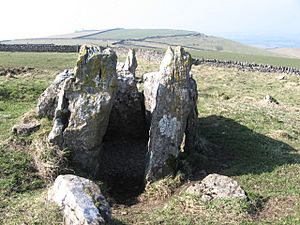Five Wells facts for kids
Quick facts for kids Five Wells |
|
|---|---|
 |
|
| Location | Peak District |
| Built | 3400–2400 BC |
| Architectural style(s) | British pre-Roman Architecture |
| Official name: Five Wells chambered tomb | |
| Designated | 5 August 1926 |
| Reference no. | 1008940 |
| Lua error in Module:Location_map at line 420: attempt to index field 'wikibase' (a nil value). | |
Five Wells is a very old burial place, known as a Neolithic chambered tomb. It is located in the Peak District in Derbyshire, between the small villages of Chelmorton and Taddington. This ancient site is found on Taddington Moor.
Contents
Discovering Five Wells
Five Wells is a special historical site. It is protected as a scheduled ancient monument. This means it is an important place that must be preserved.
What is a Chambered Tomb?
A chambered tomb is like a very old building made of large stones. It has rooms or "chambers" inside. These rooms were used to bury people a very long time ago. Five Wells was built during the Neolithic period, also called the New Stone Age. This was between 3400 and 2400 BC.
The Tomb's Structure
The main part of Five Wells is a large burial mound. This mound is more than 20 meters (about 65 feet) wide. Inside, there are two main rooms or chambers.
- The main chamber is marked by three large stones. Over time, it has changed quite a bit.
- A second chamber is located to the west. It is not as well preserved as the main one.
- Both chambers have floors made of flat stones.
Uncovering the Past
Archaeologists are like history detectives. They dig up old sites to learn about the past. Five Wells has been explored many times.
Early Excavations
The first major dig at Five Wells happened in 1846. A local archaeologist named Thomas Bateman led this work. He found the bones of at least twelve people inside the chambers.
Later Discoveries
More excavations took place between 1862 and 1901. These were done by other archaeologists, including Llewellyn Jewitt, William Lukis, and Micah Salt. They found even more interesting things:
- More human remains (bones).
- Pieces of old pottery.
- Tools made from flint stone.
- A separate cist, which is like a small stone coffin, hidden within the mound.
Visiting Five Wells
You can visit Five Wells on foot. There is a special path that leads to the site.
- One way to get there is from Pillwell Gate, which is to the west.
- You can also reach the path from the Limestone Way. This is a long walking trail that runs about 500 meters (about 550 yards) to the east, along a lane called Sough Lane.
 | Misty Copeland |
 | Raven Wilkinson |
 | Debra Austin |
 | Aesha Ash |

